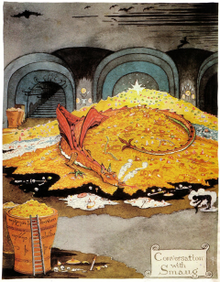| Smaug | |
|---|---|
| Tolkien character | |
 Tolkien's illustration Conversation with Smaug | |
| In-universe information | |
| Race | Dragon |
| Gender | Male |
| Book(s) | |
Smaug (/smaʊɡ/[T 1]) is a dragon and the main antagonist in J. R. R. Tolkien's 1937 novel The Hobbit, his treasure and the mountain he lives in being the goal of the quest. Powerful and fearsome, he invaded the Dwarf kingdom of Erebor 171 years[1] prior to the events described in the novel. A group of thirteen dwarves mounted a quest to take the kingdom back, aided by the wizard Gandalf and the hobbit Bilbo Baggins. In The Hobbit, Thorin describes Smaug as "a most specially greedy, strong and wicked worm".[T 2]
Critics have identified close parallels with what they presume are sources of Tolkien's inspiration, including the dragon in Beowulf, who is provoked by the stealing of a precious cup, and the speaking dragon Fafnir, who proposes a betrayal to Sigurd.[2] A further source may be Henry Wadsworth Longfellow's 1855 poem The Song of Hiawatha, where Megissogwon, the spirit of wealth, is protected by an armoured shirt, but whose one weak spot is revealed by a talking bird.[3] Commentators have noted Smaug's devious, vain, and proud character,[4] and his aggressively polite way of speaking, like the British upper class.[5]
Smaug was voiced and interpreted with performance capture by Benedict Cumberbatch in Peter Jackson's film adaptations of The Hobbit.
Cite error: There are <ref group=T> tags on this page, but the references will not show without a {{reflist|group=T}} template (see the help page).
- ^ "Timeline/Third Age". Tolkien Gateway. Archived from the original on 24 July 2023. Retrieved 24 July 2023.
- ^ Cite error: The named reference
Fafnir comparisonwas invoked but never defined (see the help page). - ^ Cite error: The named reference
Garth 2014was invoked but never defined (see the help page). - ^ Cite error: The named reference
Porter2014was invoked but never defined (see the help page). - ^ Cite error: The named reference
Shippey 2005was invoked but never defined (see the help page).